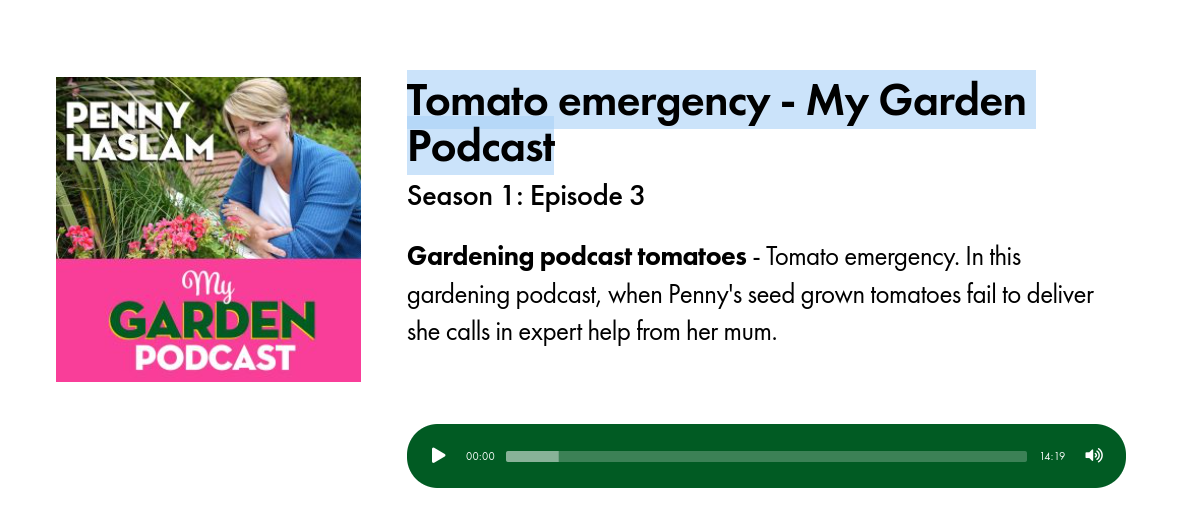You've researched your podcast keywords, it's time to use them.
Before I start a new podcast episode, I'll consider what unique keywords and keyphrases I can use for that show. You mustn't repeatedly use the same keywords or phrases on every page of your podcast website.
Here are some of the keyword themes I use for my site:
- Homepage only: "gardening podcast."
- Episode pages: "gardening podcast tomatoes", "gardening podcast sunflowers", "gardening podcast blueberries," and so on.
These may appear quite repetitive but they're sufficiently different to help Google understand what each page is about. A common mistake is to repeatedly stuff the title of your podcast or just one keyphrase on to every page. It may seem counterintuitive but don't do this because it dilutes the importance of this phrase.

The keywords I've gone for on this page are gardening podcast tomatoes. My thinking behind this:
- The keywords gardening tomatoes will have too much competition.
- People searching for gardening podcast tomatoes want to listen to a podcast about it right now.
You can see the page here:
Tip! The URL of your episode page should contain your keywords. You'll notice my keywords (highlighted) are in the slug, the end part of the URL that identifies the page or post.
Keywords in the page heading
You'll notice the page heading follows my keyword theme and includes the words tomato, garden and podcast. The first text on the page is also my keywords. This is about flagging what this page is about from the get-go.

You don't need all your keywords in the title
It's worth noting the episode name of your podcast doesn't necessarily have to follow your keyword theme. Hence my ep' title Tomato emergency, which is a little more fun than just calling it Gardening podcast tomatoes!
Image metadata
The image on this page also has a hidden "alt" or alternative description tag that includes my keywords.
Transcript
The page also has a transcript of the episode. This hasn't been altered to increase the frequency of the keywords for this page. It should naturally contain words that match the theme. I have added subheadings and titles that complement my keyword theme. More on this coming up.
Outbound links
It's a good idea to include at least one relevant outbound link. I've placed this at the very end of the post to an article about growing tomatoes.
Keyword stuffing
Try not to overdo it when placing keywords. They should feel like a natural part of the text.
Keyword stuffing is a search engine optimization (SEO) technique in which a web page includes an excessive number of keywords or phrases in an attempt to manipulate the page's ranking in search engine results pages.
Keyword stuffing is typically done by adding an excessive number of keywords or phrases to the content of a web page, either in the body of the text or in hidden areas such as the meta tags or the alt text of images.
However, search engines have become sophisticated at detecting and penalizing keyword stuffing, and it is generally not an effective SEO strategy. Instead of keyword stuffing, it is generally better to focus on creating high-quality, relevant content that naturally includes relevant keywords and phrases.

Introduction: How to grow your podcast
Get started with podcast SEO
Using Keywords to improve podcast website SEO
- Google Ads tutorial - Discover keywords for your podcast
- Answer the Public tutorial - Is your podcast answering people's questions
- Put your podcast keywords to work
Get to grips with podcast transcriptions
- Why should I use podcast transcriptions
- Software to transcribe your podcast - Coming soon